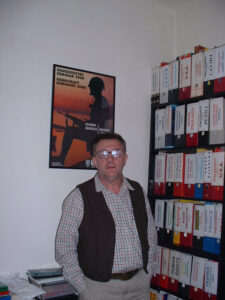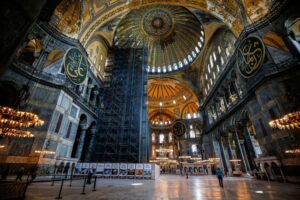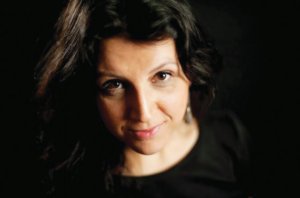Venko Andonovski (1964), the bestselling novelist, short-story writer and playwright
during the last fifteen years in Macedonia. His work has been translated in 12 languages.
International achievements: international literary award “Balkanika” (the best book
in Balkan literatures) for his novel “The navel of the World” (2001), literary award
Petar Kochich (in Serbia) for the novel “The Witch”, literary award “Yugra” (in Russia,
for novel of the year in all Slavic literatures, 2011) for “The Navel of the World”, as well
as nomination for the Tolstoy’s Prize, 2018, for the same novel.
For the French edition of the novel “The Witch”, Milan Kundera wrote: “If I talk
about Hermann Broch and Carlos Fuentes, it is to say that Venko Andonovski’s novel is
part of the same third epoch of the history of the novel where the novelist refuses to obey
the traditional form of novel as a necessity. In this superbly polyphonic work in which the
variety of narrative techniques surprises, and delights the reader, the evocation of witchcraft is constantly accompanied and enriched by stories set in contemporary life, so The Witch becomes a great novel about Europe. Past and present Europe.”
By Venko Andonovski
I was born and still live in the Balkans. I was born and went to school in one country (the Socialist Federal Republic of Yugoslavia), got a job in another (the Republic of Macedonia), and will collect any pension I’m lucky enough to receive in a third: the Republic of North Macedonia. That itself is proof that I live in the Balkans – a place where, as my friend Goran Stefanovski wrote, you go to sleep in one country and wake up in another.
That means I’m a Balkanite: I live on constantly shifting soil, not only for geologic or seismic reasons, but also geopolitical ones. Yet while I may be a Balkanite, I know very little about the Balkans. I know some history and something about the present (mainly the political situation in the various countries). When it comes to the Balkans, though, what I know the least about is the current status of its culture. And this as a writer and university professor who teaches, among other things, cultural studies! It’s as though a bunch of Great Walls of Culture have been put up between the people of the Balkans, just so they don’t come into contact with each other. This particular type of cultural quarantine is painfully obvious. We are usually inclined to blame it on politicians even as a large part of the responsibility rests on us, the artists and “cultural workers.”
In 2001, I was overjoyed when, as a 37-year-old writer in my prime, my novel, The Navel of the World received the “Balkanika” international award for the best book published in Balkan literatures. At that time in the Balkans, it was important to rebuild bridges that had been partially destroyed by the war in the former Yugoslavia and the country’s “deconstruction.” The award was not accompanied by a monetary sum, but it offered something much more significant: a translation of the book into all Balkan languages whose countries had members participating on award distribution board at that time and from whose literatures books had been nominated as award candidates. That meant that my novel would soon be found on the shelves of bookstores in Greece, Bulgaria, Serbia, Albania, Romania, and Turkey – really was no small thing, if you think about it! My novel would soon meet all of these cultures, and I myself was already leaving local, marginal, Macedonian literature (where I had already garnered all possible prizes and was thankful for these, perhaps even too thankful!). Instead, I was becoming, in some sense, a writer of the region, and that meant also becoming a part of the world.
The upshot: my novel appeared only in Bulgarian and Greek. I was surprised that the book had been published both by the Bulgarians and by the Greeks (with whom Macedonia had been in a political standoff about the country’s name before the war). In any case, the novel became a part of these two cultures. As of April of this year, a full eighteen years after its original publication, my novel is just coming out in Serbia! Thus, Albania, Turkey, Romania, and Serbia did not do what they were obliged to do. The score was devastating: 2:4 in favor of Balkan Great Walls of Culture. In the meantime, The Navel of the World had been published in Croatian, Slovenian, Russian, and English (not through my own efforts, but on the initiative of writers and publishers from those countries).
Why had my novel not been published in Serbian and Albanian when there exists between the Serbs and me only a single provisional administrative border that is easily crossed with a simple ID card? And when no border at all divides me from Albanians, with whom I live in Macedonia itself? Until two months ago, I didn’t have my own literary agent (I belong to that category of writers who don’t care much about the international presentation of their work), but I doubt that an agent would have been able to do much even now. Yet I repeat: the Balkan language translations were an obligation agreed upon by all publishers and countries taking part in the board distributing the award.
To tell the truth, I published the Serbian edition myself, through a friend at the “no name” publishing house. I didn’t have the money to self-finance the book’s media campaign, though, so it was noticed about as much as one of those lazy flies buzzing around the fan in a Sergio Leone Spaghetti Western. On the other hand, my Albanian friends, colleagues in the Department of Albanian Language and Literature at the Philological Faculty in Skopje (where I work), and especially the recently departed Qani Mehmeti and Professor Agim Leka (who most recently was the Macedonian ambassador to Egypt) worked their tails off to translate some of my work in Albanian. They published it not in Albania, but here in Macedonia, so Albanians from Macedonia would get to know me as a writer. Unfortunately, this didn’t bear fruit. I remember my colleague Qani Mehmeti telling me that he had given his students in the department some fragments of my novel as a translation exercise to work on together. Death, however, prevented him from finishing this work.
I don’t think the reasons The Navel of the World wasn’t published were political in nature; that is just an excuse. The reason is much more serious, in my opinion: the culture here in the Balkans operates on mutual contempt and scorn. We tear our own hair out because we don’t respect the other. Ask a Macedonian in Macedonia to list two important contemporary Albanian writers from Albania and at least three from Macedonia. I work with both Macedonian and Albanian students and I am convinced that these two literatures, these two cultures, don’t know each other at all, especially not these days. Ask these students to also give you the name of one contemporary Romanian or Greek author. They won’t know a single one. While they might have heard of a few Serbian authors, that list won’t be especially long either. But ask them to give you all the titles of the cheap Guillaume Musso bestsellers and you’ll get a scroll of Spartan papyrus two meters long. Ask them when the last time was that they went to see a play from Albania or Macedonia in a theater. I myself can’t think of a time – to say nothing of these young folks. Ask when last a Macedonian theater company was invited to Albania: I believe there was a festival about ten years ago in Sarandë where one of our performances appeared. Let’s not even talk about cultural exchange with Kosovo. If that even exists, it’s only on the level of personal friendships and connections.
What is going on with us Balkan artists? Should it even be possible for us to resist the natural laws of any culture, those that dictate its openness to neighbors, first of all, and then to more distant cultures? A culture that is not open to intercultural dialogue, to collaboration and rivalry, is a canned one, hermeneutically sealed, an archaic culture of totems and taboos. It would seem that we are slaves to precisely these taboos, terrified of coming into contact with Others, those different from us, because we are afraid that our local cultural totem will fall or be besmirched by “other people’s fingerprints.” In addition, there are cultural prejudices in the Balkans that nurture political prejudices like fast food: we divide Balkan languages and cultures into “marginal” and “imperial,” into “small” and “great,” without understanding that the concept of a “great culture” has absolutely nothing to do with quantity, but instead with quality! Cultures develop extensively or intensively, just like someone can read extensively (by reading many books on a surface level and equating this with learning) or intensively (by reading two or three books in depth). Ismail Kadare alone is enough for Albanian literature to be numbered among the great cultures, just as Petre M. Andreevski is sufficient to stop calling Macedonian culture “small” or “marginal.”
In my lectures as a cultural studies professor, I often use the model of culture proposed by Yuri Lotman in his Semiosphere. In this model, when one culture (or semiosphere) comes into contact with another (especially in the case of two cultures that are neighbors in a spatial or geographical sense), it is impossible to prevent the capillary osmosis of one culture into the other. Cultural osmosis, the capillary “leakage” of one culture into another, is impossible to prevent. In the Balkans, though, we make manifest that it is possible! Or at least that it’s possible to delay that capillary seeping of one culture into another. Why these delay tactics? What is gained by them? Perhaps the reasons are in some way political or concern political stereotypes about the Other.
For this reason, I welcome the creation of Academia Balcanica Europeana and The Bridgemagazine with my whole heart and soul and have taken on the task of writing this essay, which deals primarily with personal experience. I am hopeful that cultural osmosis and the capillary interpermeation of our various cultures will, ultimately, win out, destroying the Great Walls of Culture. I believe this will happen: a single droplet that falls patiently and continuously is stronger than the stone and will one day certainly pulverize that stone.
I would like to say a few more words about the cultural walls that exist within Balkan nations, especially within my own Macedonia, now called North Macedonia. After all the political changes that emerged after Macedonia seceded from Yugoslavia, a political question was posed concerning the rights of ethnic Albanians who had lived for centuries in Macedonia. As usual, the politicians solved this with a magic wand that they termed “coexistence” between Macedonians and Albanians. According to the well-respected philosopher, Professor Ferid Muhić, I was one of the few people working on cultural issues to object to the use of this term. While “coexistence” might solve the problem of relations between Albanians and Macedonians in Macedonia on a political level, this term is ineffectual and meaningless – even harmful – when it is used in a cultural sense, and even more so when it is used to talk about real life. Politicians like “coexistence” because they have, in essence, established purely national parties in Macedonia. As a result, the media talks about “collaboration,” “co-living,” or “coalitions” between ethnically pure Albanian and ethnically pure Macedonian parties. This is meaningless, even according to a politically-driven plan, because it rests on a fundamental contradiction: how do you create a civic concept of the state (with the notion of the citizen at the center) while using the model of political parties based on the notion of pure ethnicity? In that case you, as a party and despite any declaration to the contrary, would fight for national rights and against civic rights, because the civic concept of the state dictates that citizens are all equal without regard to nationality or confession.
This political contradiction has already resulted in terrible consequences for Macedonian culture. It is in direct contrast with Lotman’s model of culture, which calls for capillary osmosis between cultures. Simply put, it is impossible to speak about the “coexistence” of two cultures without also presuming the possibility of interpenetration of these cultures. In Macedonia, Macedonian political parties can “form coalitions” with Albanian political parties to, above all, preserve their own narrow, national interests. Meanwhile, Albanian artists in Macedonia cannot form “coalitions” with Macedonian artists and, in that way, remain “equal” through cultural collaboration. Culture is more contagious than a virus; it spreads and produces acculturation, especially when, for example, we read a book from another culture. After reading Kadare or an Albanian writer from Macedonia like my friend Kim Mehmeti, I myself am, at least minimally, acculturated into or brought into contact with Albanian culture, traditions, customs, folklore, history, and confessions. I am no longer the same person I was before I read that book. And that equally applies to Kadare or Mehmeti when they read my books. Albanian or Macedonian politicians may remain “themselves” even after forming “coalitions,” but that is not the case for artists. It’s not the case for regular people either. Macedonians and Albanians would, in earlier times, fraternize (for example, my father had an Albanian blood brother, a bond forged after the latter meaningfully assisted my father one time). We would drop in on each other for holidays – even religious ones – and pay respect to each other’s customs at home. I recall that when we would stop by my father’s Albanian blood brother’s place for baklava, he would make it using artificial sweetener, knowing that my mother was diabetic. What is today’s “coexistence” in comparison to the existence we once had?! “Coexistence with Albanians or Macedonians” is completely different from existence with Albanians or Macedonians. The former is just an empty political cliché. We don’t dare to live as two different biocenoses(two types of organisms) sharing the same living space (biotope). Instead, nobody mixes with anyone else, and everyone sticks to his own job.
In these parts, culture is seen as subversive because of the artificial divisions that politics thinks up and traces out. For example, in 1998, I wrote a play that was a critique of cultural imperialism and colonialism and which called for the demise of smaller, especially Slavic cultures. The play was called “The Slavic Ark.” The play’s director, the late Dimitar Stankovski, a dear friend of Bajrush Mjaku, the premier actor of the Albanian Theater in Skopje, gave, on the latter’s recommendation, the leading role to an erstwhile young and unknown (but now esteemed) actor, my friend Refet Abazi. Refet was at that time a newcomer to the Skopje Albanian theater stage. He acted the role in pure Macedonian and the play’s premier was met with standing ovations. Meanwhile, no less than a hundred people, including gaggles of young women, asked me (as the play’s author): for God’s sake, who is that young Macedonian actor who has sprung on the stage, and why hasn’t anyone seen him before in Macedonian productions or TV series? When they found out that his name was Refet Abazi, nobody could believe that he spoke Macedonian better than half the audience – maybe even better than some of our Macedonian actors. Yet this was the personal decision of a single Macedonian director, to “inject” a little drop of “another” neighboring culture into ours using capillary action. It ended there and I’m not aware of another case when this was repeated.
Let me give just one more example of how the capillary movement of culture cannot be prevented, no matter what kinds of walls are set up between the semiospheres. As a professor, I served as a proud mentor to several of my juniors, Albanians from the Philological Faculty in Skopje. I will always remember this particular case: a smart young Albanian student came to my office, asking me to serve as an advisor on a thesis that he wanted to write, comparing the narrative structure of the Bible and the Koran. My hair stood on end. I told him that his was the topic for, at the very least, a dissertation and that, moreover, I wasn’t up to the task of advising him, since I wasn’t familiar with the Koran. He left my office in disappointment. Walking home, I noticed someone selling books on the Stone Bridge and spied, among the other offerings, a Koran in Macedonian! I bought it and began to read it. A week later, I ran into the student again. I told him that I thought his topic was an excellent one, that I had begun to read the Koran, and that I would be delighted to serve as his advisor. We had capillarily exchanged confessions. How else would I have chosen to read the Koran, out of all the other specialist books of aesthetics or narratology, of semiotics or cultural studies?
We successfully defended his dissertation. I’m using the plural here intentionally: I also completed a type of doctorate, in an invisible way, by serving for the first time as an advisor!
So that’s why I do believe that a droplet is stronger than a stone, a capillary stronger than a wall, and osmosis stronger than concrete. Balkan culture must win out. If the politicians won’t do it, then we ourselves must. We’re in the car, heading out with a fistful of dollars, ready to meet the Others. Just like in those great films.
Translated by Antje Postema







